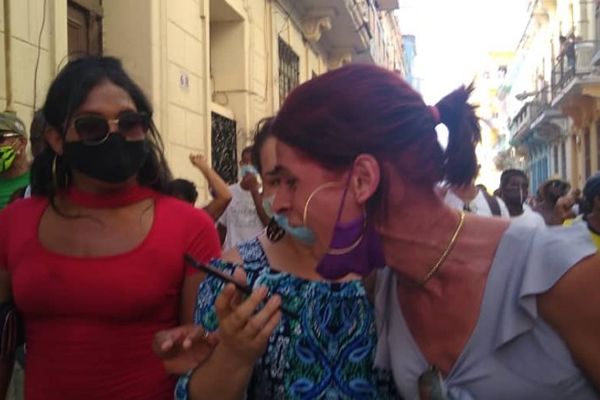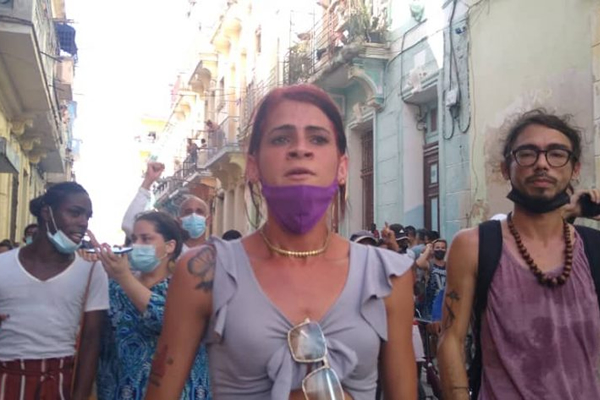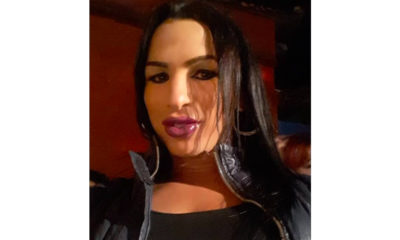World
LGBTQ Cubans participate in July 11 protests
Community members took to the streets to demand their rights

HAVANA — Thousands of people took to the streets in Cuba on July 11 to demand, among other things, the government improve people’s quality of life and guarantee citizens’ rights.
The protests took place in cities throughout the country, but violence that had not been seen before broke out in some Havana neighborhoods. Protesters for the first time in Cuba with such magnitude overturned police cars, looted stores and threw stones at police officers.
Parts of the LGBTQ community joined the marches. They had particular reasons for protesting that were in addition to the protesters’ general demands.
“I came because I am tired of the repression that the police inflict upon trans people,” a transgender woman who was marching among thousands of people through Centro Havana told Tremenda Nota. “They don’t allow us to go out on the streets, they ask us for our ID cards, they take us in for prostitution.”
Adriana Díaz Martínez walked with other trans women. They chanted, along with the rest of the protesters, “freedom,” “Díaz-Canel must go” and “homeland and life.” This last slogan, one of the most popular in the protests, is the title of a song from artists Yotuel Romero, Descember Bueno, Maykel Osorbo, El Funky and Gente de Zona. It has in recent months become an anthem for those who oppose the government.
Analía Escalona, one of Adriana’s friends, cited the shortage of basic products as one of the reasons to protest.
“The first thing that has to be in a pharmacy is condoms in order to take care of yourself and not contract any sexually-transmitted infection, and there aren’t any,” said Analía.
Analía also mentioned police harassment of trans people as another reason to march.
“They bring us to police stations for no reason, they put us in ‘danger,’ families are working, bringing sacks to a prison without any need at the end,” she added.
When speaking of “danger,” she referred to the “dangerous state” provision of Cuban law that allows authorities to impose punishments against anyone who has not yet committed a crime.
“We are mistreated by the same police. It is bullying and abuse. Enough already,” stressed Chanel, another trans woman who participated in the march.
“I have a degree. I have a masters degree in cosmetology. There is no need to detain us, to put us in ‘danger’ without reason,” said Analía. “We are all not prostituting ourselves, damn it! Homeland and life!”
“I come in solidarity with everyone else who is here, because of hunger, necessity,” said Adriana. “There are no medications, there is no food. There is no water. There is nothing. Houses in Havana are collapsing and they are building hotels!”
The economic crisis in Cuba, which the COVID-19 pandemic and U.S. sanctions worsened, became extreme in 2020. Official sources say the economy has contracted by 11 percent.
The economic collapse is even worse for trans people. It remains difficult for these women to finish their studies or get a formal job in Cuba.
“We need workplaces for trans people, where we can go dressed as a woman,” said Adriana.
The Labor Code currently bans discrimination based on sexual orientation, but it does not afford the same protection to those who are fired because of their gender identity.

Tremenda Nota journalist Maykel González Vivero was detained during last Sunday’s protests and was transported to “El Vivac,” a provisional jail outside of Havana.
The reporter was held with two trans women. Both of them live in Arroyo Naranjo, a municipality in the outskirts of Havana, and participated in the protests in La Güinera, one of the city’s poorest neighborhoods. Official media described the protests that happened there were among the most violent.
González Vivero told Tremenda Nota that the police from the start treated the trans women as men by addressing them by their legal name.
Both of them told the journalist that courts had previously sanctioned them and Cuban prison regulations ignore their gender identity. They cited, for example, the masculine hair cut they forced them to get.
Kenya
Kenya Red Cross-owned hotel to host anti-LGBTQ conference
Speakers from US, European countries to participate in May 12-17 gathering

Plans to host a family values meeting next month in a 5-star hotel in Nairobi that the Kenya Red Cross Society co-owns have sparked an uproar among local queer rights groups.
The groups accuse the Kenya Red Cross of violating its Global Fund commitment of protecting key populations by allowing its Boma Hotel to host an “anti-gender and anti-LGBTQ” conference.
Influential guest speakers from the U.S., the Netherlands, Spain, and Poland will preside over the Pan-African Conference on Family Values that will take place from May 12-17. The Kenyan advocacy groups say these speakers’ organizations are globally recognized for undermining LGBTQ rights.
“As the principal recipient of Global Fund in Kenya, hosting this event contradicts (the) Red Cross’s humanitarian mission and threatens the safety and dignity of people living with HIV, women and LGBTQ+ individuals, the communities that Kenya Red Cross Society has long committed to supporting,” the queer rights groups state.
The LGBTQ groups that have criticized the Kenya Red Cross include Upinde Advocates for Inclusion, the Initiative for Equality and Non-Discrimination, and Gay and Lesbian Coalition of Kenya. They have also launched an online signature collection drive to compel the Kenya Red Cross to withdraw the hotel from hosting the “Promoting and Protecting Family Values in Challenging Times”-themed conference.
“The event’s so-called ‘family values’ narrative is a smokescreen for policies that push hateful legislation and promote death, discrimination, femicide, gender-based violence, and restrict fundamental freedoms across Africa,” the groups said.
The pro-life Western organizations that are scheduled to participate in the conference include Family Watch International from the U.S., CitizenGo from Spain, the Ordo Luris Institute from Poland, Christian Council International from the Netherlands, the New York-based Center for Family and Human Rights (C-FAM), and the Foundation for American Cultural Heritage. Their local counterparts include the National Council of Churches of Kenya, the Kenya Christian Professionals Forum, the Africa Christian Professionals Forum, and the Evangelical Alliance of Kenya.
C-FAM President Austin Ruse; Family Research Council Vice President for Policy and Government Affairs Travis Wever; Global Life Campaign Executive Director Thomas W. Jacobson; and the Rev. Ricky Chelette, executive director of Living Hope Ministries, Inc., and president of the Institute of Biblical Sexuality are among the U.S. guest speakers. Other participants include Henk Jan van Schthorst, president of Christian Council International’s board of directors, Ordo Luris Institute President Jerzy Kwasniewskie and his colleague, Rafal Dorosinski, director of the group’s Legal Analysis Center.
The Kenyan groups through their online petition — “Tell Red Cross Kenya Not to Give Hate a Platform” — has so far raised more than 1,000 of the 10,000 signatures they hope to collect. The petition is addressed to Red Cross Kenya Secretary-General Ahmed Idris and his predecessor, Abbas Gullet, who is the hotel’s director.
“We call on you to immediately cancel this booking and publicly reaffirm Red Cross’ commitment to human rights, health and inclusivity,” the petition reads. “Failure to act will raise concerns about whether (the) Red Cross can still be trusted by the community to lead with empathy and fight for their rights.”
The Kenya Red Cross, however, maintains the Boma Hotel is a separate entity, even though public records indicate it is one of the facility’s shareholders.
The LGBTQ groups note the hotel should be a safe space that promotes inclusion, not platforms that enable “harmful gathering” for hate and exclusion by “dangerous groups.”
“By providing a venue for this event, Red Cross directly enables a platform for hate and discrimination — a stark contradiction to the values of inclusivity, humanity, and nondiscrimination that the organization claims to uphold,” they said.
The organizations further warn that proceeding to host the conference threatens the relationship between the Red Cross and the marginalized communities who have long depended on the humanitarian organization for support and protection. CitizenGo has nonetheless criticized the LGBTQ groups, which it describes as “radical activist groups” for “trying to silence a pro-family event” and asked the Kenya Red Cross and the Boma Hotel not to back down.
“These groups are calling the event ‘hateful’ because it affirms the natural family — marriage between a man and a woman — and the dignity of every human life, including the unborn,” Ann Kioko, the group’s campaign director for Africa and the U.N., said.
Through an online counter signature collection drive, Kioko holds CitizenGo and other groups won’t be intimidated, silenced or apologize to the queer rights groups for defending “our families, our faith and our future”.
“The real goal of these foreign-funded activist groups is to impose LGBTQ and gender ideologies on Africa — ideologies that have led elsewhere to the confusion of children, the breakdown of family structures and the rise of sexual libertinism that results in abortion, STIs and lifelong emotional and psychological trauma,” Kioko stated.
India
Opposition from religious groups prompts Indian Pride group to cancel annual parade
Event was to have taken place in Amritsar on April 27

Pride Amritsar, a student-led organization in the Indian state of Punjab, earlier this month announced the cancellation of its Pride parade that was scheduled to take place on April 27, citing opposition from certain religious groups.
The event, planned for the Rose Garden in Amritsar, a city revered as a spiritual center of Sikhism, had faced mounting resistance from Sikh religious organizations, including the Nihang Singh faction and the Akal Takht, the faith’s highest temporal authority. These groups labeled the parade as “unnatural” and urged local authorities to deny permission, citing its potential to disrupt the city’s religious sanctity.
In an Instagram post on April 6, Pride Amritsar organizers Ridham Chadha and Ramit Seth elaborated on its mission and the reasons for the cancellation.
“Since 2019, we have organized peaceful parades and celebrations in Amritsar to connect and uplift the LGBTQIA+ community, with a particular focus on transgender individuals and their rights,” their statement read.
Chadha and Seth highlighted Pride Amritsar efforts in providing guidance, counseling, and job opportunities, which have been met with positive responses. However, due to opposition this year, Pride Amritsar announced the cancellation of the 2025 parade.
“We have no intention of harming the sentiments of any religious or political groups,” the statement read. “The safety of our members is our top priority, and we will take all necessary measures to ensure their protection.”
Chadha and Seth spoke with the Washington Blade about their decision to cancel the parade.
They explained that resistance came from both religious and political groups who labeled the parade and its values as anti-Sikh and contrary to Punjabi and Indian cultural norms. Critics specifically objected to the event’s location in Amritsar, a city regarded as a sacred center of Sikhism, arguing that the parade would disrupt its spiritual purity.
Chadha and Seth stressed Pride Amritsar lacks political, financial, or legal support. Composed of students and young professionals, the group organizes the parade biennially, dedicating personal time to advocate for the LGBTQ community.
“We do it independently, crowdfund the parade and cover the rest with our pockets,” said Seth and Chadha.
When asked by the Blade why Pride Amritsar did not approach the High Court or local authorities to protect the parade, despite the Supreme Court’s 2018 ruling that decriminalized consensual same-sex sexual relations, Chadha and Seth cited significant barriers.
“Pursuing legal action in India requires substantial resources, both financial and temporal,” they explained.
Chadha and Seth also noted that such action could lead to public shaming and unwanted publicity for participants, potentially harming their careers in Amritsar. They therefore chose not to pursue legal recourse.
Chadha and Seth said Pride Amritsar does not have any plans to hold alternative events.
“We are still exploring options, but we are likely not holding any events this year,” they said, citing significant harassment that organizers faced and the need for time to plan how to best serve the local LGBTQ community moving forward.
“Our evaluation of what the biggest challenge is has changed after this year,” said Chadha and Seth to the Washington Blade. “The biggest challenge, by far, seems to be education. We need to educate the community about what the community is, does, and why it exists. Why we do parades. Why we dance. Why calling someone ‘chakka’ is harmful. How we actually fit into religion and fall within the guidelines.”
Chadha and Seth said organizing the parade in Amritsar since 2019 has been an uplifting experience, despite continued opposition.
“The moment you join the parade, chant a slogan, or sing a song, it’s transformative,” they said. “Fear vanishes, and a sense of freedom takes over.”
The cancellation of the 2025 Amritsar Pride Parade has sparked concerns among activists in Punjab, as the Indian Express reported.
The Punjab LGBT Alliance and other groups expressed concern that the decision to cancel the parade may strengthen opposition to future LGBTQ-specific events.
Australia
Australian LGBTQ rights group issues US travel advisory
Equality Australia warns transgender, nonbinary people of ‘serious risks’

An LGBTQ rights group in Australia has issued a travel advisory for transgender and nonbinary people who plan to visit the U.S.
Equality Australia on April 14 posted the advisory to its website that states the U.S. government’s policy on visas and Electronic System for Travel Authorization or ESTA “appears to be” the following:
• To use the term “biological sex”
• To only use the gender marker recorded at a person’s birth, even if this differs from their gender
• That valid foreign passports with an ‘X’ gender marker and a valid visa (if needed) may continue to be admitted, however this is contingent upon satisfying inspection of their admissibility by the U.S. Customs and Border Protection officer at the port of entry
• That any previously issued, valid visa may remain current until its expiration date and the visa holder does not need to apply for a new visa with an amended gender marker until the current visa expires (it is unclear whether this applies to ESTAs)
• That new visas will only be issued under the gender marker recorded for the applicant at birth (it is unclear whether this applies to ESTA applications, although only ‘M’ and ‘F’ gender marker options are available for ESTA applications)
• That if consular officers assessing visa applications become aware an application does not contain the gender marker recorded at the applicant’s birth, they should assess additional evidence (such as previous travel records, although the scope is unclear), and/or conduct interviews and
• That where individuals are not using the gender marker recorded at their birth, consular officers should consider classifying the application as procuring a visa through material misrepresentation or fraud, which results in a lifetime bar from the U.S.
President Donald Trump shortly after he took office on Jan. 20 issued an executive order that bans the State Department from issuing passports with “X” gender markers. Secretary of State Marco Rubio in response to directive ordered State Department personnel to “suspend any application requesting an ‘X’ sex marker and do not take any further action pending additional guidance from the department.” A federal judge in Boston on April 18 issued a temporary injunction against the Trump-Vance administration’s directive.
Equality Australia says its advisory is “relevant if you are traveling to the U.S.” and fall under the following criteria:
• Hold a passport with a gender ‘X’ marker
• Have identity documents with gender markers different to those assigned to you at birth, or where other relevant details (such as your name) have been changed
• Have gender markers in your identity documents that do not match your gender expression
• Have a track record of LGBTIQ+ activism or other political activity.
“Travel to the U.S. carries serious risks that should be considered before planning any travel, particularly if you fall under one of the above categories,” reads the advisory.
Germany, Denmark, Finland, and the Netherlands are among the countries that have issued travel advisories for trans and nonbinary people who plan to visit the U.S.
WorldPride is scheduled to take place in D.C. from May 17-June 8.
InterPride, the organization that coordinates WorldPride events, on March 12 issued its own travel advisory for trans and nonbinary people who want to travel to the U.S. Egale Canada, one of Canada’s largest LGBTQ advocacy organizations, in February announced its members will not attend WorldPride and any other event in the U.S. because of the Trump-Vance administration’s policies.
-

 Federal Government4 days ago
Federal Government4 days agoHHS to retire 988 crisis lifeline for LGBTQ youth
-

 Opinions4 days ago
Opinions4 days agoDavid Hogg’s arrogant, self-indulgent stunt
-

 District of Columbia3 days ago
District of Columbia3 days agoD.C. police seek help in identifying suspect in anti-gay threats case
-

 Virginia4 days ago
Virginia4 days agoGay talk show host wins GOP nom for Va. lieutenant guv











